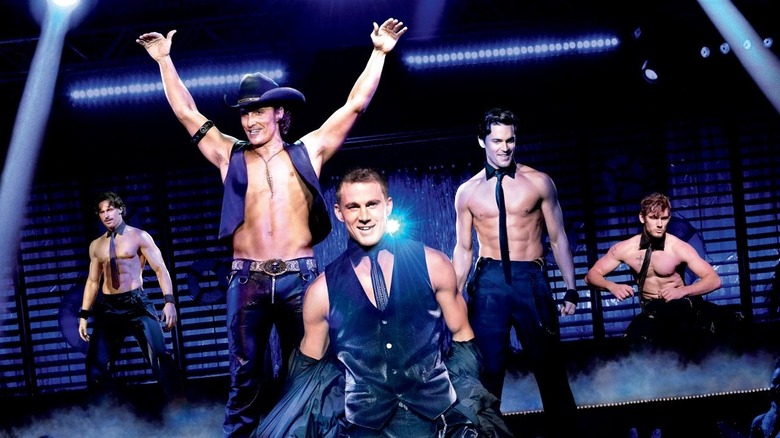
(Welcome to Tales from the Box Office, our column that examines box office miracles, disasters, and everything in between, as well as what we can learn from them.)
There are movies that are hits and nothing more. They arrive in theaters, make their money, and sort of disappear into the wind. Everyone is happy, but the world largely moves on. A great example is Tim Burton's "Alice In Wonderland," which somehow made $1 billion long before that was a thing that movies were regularly doing. But then there are the hits that sort of sneak up on the world and catch a wave in the pop culture zeitgeist, becoming a real deal hit that will live on indefinitely in the future. Such was the case with "Magic Mike."
Warner Bros. partnered with Channing Tatum (very much a star working his way up the A-list back in 2012) as well as Steven Soderbergh, the director of hits such as "Ocean's Eleven" and "Erin Brockovich." Sold to the public as the hot guy stripper movie with a love story at its center, "Magic Mike" made a great deal of money because, quite frankly, what was being marketed was something that hadn't been seen much in mainstream cinema: a raunchy film aimed squarely at women. While that is certainly an element of the film, Tatum and Soderbergh did manage to sort of pull one over on unsuspecting moviegoers looking for a cheap thrill, as they crafted a film about much more than dudes taking their clothes off.
In honor of the movie's tenth anniversary this week, we're going to look back at "Magic Mike," how it came to be, the marketing genius that turned it into a huge hit, and what lessons we might be able to learn from it a decade later. Let's dig in, shall we?
The Movie: Magic Mike

As is so often the case with great cinema, "Magic Mike" was inspired by Channing Tatum's real-life experience as a stripper when he was 18/19. There is absolutely a version of this that devolves into "Striptease" but with male strippers. However, from the outset that is not what Tatum had in mind. In a 2012 interview, Tatum explained what he was looking to capture with the film:
"It was the atmosphere and energy of it I wanted to capture, and that feeling of being at a time in your life when you're trying things out, and up for anything. You might have a plan for the future, but for now it's about that next paycheck, that next party, and just having a good time."
The movie largely centers on Tatum's titular Mike, who is a stripper but has deep ambitions and hopes to start his own furniture company. As a result, he works several jobs to try and hustle his way to his dream. He then encounters a kid named Adam (Alex Pettyfer), whom he ends up taking under his wing. Adam also becomes a stripper, but the lifestyle gets the best of him. (Believe it or not, there is a dark side to a career path such as this.) There's also the matter of Adam's sister Brooke (Cody Horn), for whom Mike has developed feelings, only serving to further complicate matters. Not to mention Matthew McConaughey as Dallas, who is looking to go into business with Mike on a bigger club in Miami.
All of this serves to add layers to "Magic Mike" that go far beyond hot guys taking their clothes off. Is that an element of the movie? You bet! Audiences would have rioted if it hadn't been. But what nobody could have known is that Tatum and Soderbergh had far more in mind.
A Marketing Dream

Tatum was not only a rising star, but also a dreamboat who had become the object of many women's affection. He was surrounded by an equally dreamy supporting cast including Joe Manganiello and Matt Bomer, amongst others. Quite frankly, the base premise coupled with that cast, along with the underserved market of women moviegoers, made for a perfect storm from a marketing perspective. We only need to look back at the original trailer to understand how this was obviously going to be sold to the moviegoing masses.
Yet, as the Entertainment Weekly pull quote on one of the posters proudly proclaimed, this was the "'Citizen Kane' of stripper movies." That trailer, with all due respect, is selling something far less profound. But that's the idea. It should have been obvious that we were in for something more with a guy like Soderbergh in the director's chair, working from a script by Tatum's producing parter, Reid Carolyn. Amazingly enough, Tatum originally had Nicolas Winding Refn ("Drive") in mind to direct this film.
But after working with Soderbergh on "Haywire," the two decided to partner up for another very different ride together. One that was very marketable, yet one that they could sneak a subversive, compelling story with depth into, while also giving audiences what they were paying to see. A perfect storm by Hollywood standards.
The Financial Journey

Soderbergh and Tatum partnered to produce the film independently with a lean $7 million production budget. Warner Bros. wisely acquired the U.S. distribution rights, seeing the film's commercial potential. The studio released "Magic Mike" in theaters right in the prime of the summer movie season on June 29, 2012. What's kind of remarkable is that it didn't even top the charts in its opening weekend, losing to Seth McFarlane's "Ted," yet it still made $39 million, coming in at number two. Meanwhile, Pixar's "Brave" earned $34 million in the number three spot. It was a very different time.
"Magic Mike" fell all the way to number five in weekend two, taking in $15.6 million, but all things considered it held very well despite a lot of competition from other summer tentpoles like "The Amazing Spider-Man" and "Ice Age: Continental Drift." Held well enough, in fact, to finish its domestic run with an eye-popping $113.7 million, to go with an international haul of $54 million for a grand total of $167.7 million -- a huge success considering its tiny budget. Not bad for a stripper movie that essentially Trojan Horsed the audience into watching a subversive story with something to say.
Naturally a sequel was made in the form of "Magic Mike XXL" which, quite honestly, more closely resembles the film that audiences probably thought they were getting the first time around. And, as one would guess, "XXL" did exceptionally well, bringing in $123.5 million, meaning the two films made a combined $294.1 million against combined budgets totaling just $21.5 million. That is what studios might call the good s***.
The Lessons Contained Within

First of all, I must once again beat a drum I beat often around these parts, but it is never not worth saying: reasonable budgets are the path to success. There is a version of this movie that inflated its budget with big names and big paychecks that, inevitably, would have gotten in the way of what Soderbergh and Tatum wanted to do in the first place. Not letting budgets get out of control provides an easier path to profitability and, in this case, almost certainly allowed for "Magic Mike" to become a better movie than the premise suggests it could have been.
Aside from that, there is absolutely a lesson in here about taking a marketable premise and allowing it to be something more. In an age when so many superhero and franchise films are made simply because they are amongst the only safe bets left in the theatrical side of the movie business, it is easy for studio films to become a bit formulaic. "Magic Mike" could have been a paint-by-numbers film and sure, it probably would have still made a lot of money. However, because it was something more and surprised a lot of people who expected less, it has enjoyed a longer shelf life with people (such as myself) discovering it with pleasant surprise after the fact.
To that end, we're getting a third "Magic Mike" film that will supposedly be the character's "last dance." Now, will this movie be closer to the original or more "XXL?" It's hard to say, but the fact of the matter is that Warner Bros. and Tatum found themselves with an enduring franchise because it was made responsibly and made with purpose. More franchises could stand to learn a thing or two from this delightfully deceptive stripper flick.
Read this next: The Best Movies Streaming Right Now: Malignant, A Hero, And More
The post Tales From The Box Office: Magic Mike Made Bank As A Trojan Horse Stripper Movie appeared first on /Film.
0 Comments